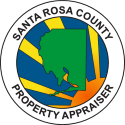Exemptions
Jump To…
- When to File
- Exemption Renewal
- Homestead Exemption
- Portability
- Active Duty Military
- Senior Exemption
- Widow/Widowers Exemption
- Medical Disability Exemption
- Total and Permanent Disability
- Surviving Spouses of First Responders
- Senior Longevity Exemption
- Deployed Military Exemption
- Veteran's Partial Disability
- Veteran's Discount
- Veteran's Total Disability
- Service-Connected Total & Permanent Disability
There are several exemptions available for homeowners, individuals, institutions, veterans, disabled, widows, widowers, not for profit organizations, economic development, etc.
Homestead tax exemption is the most common exemption applied for and granted in Santa Rosa County. If you own property that you use as your primary residence as of January 1, you may apply for the Homestead tax exemption. This will reduce the taxable value on your home up to $50,000 on your county assessment, resulting in substantial savings on your property taxes. A person may have only one permanent residence at a time.
State of Florida Eligibility Criteria to Qualify for Property Tax Exemptions
When to File (Florida Statute 196.011): Application for all exemptions must be made no later than March 1 of the assessment year, however late applications may be accepted in certain instances. You may pre-file your exemption for the forthcoming year after April 1.
Exemption Renewal (Florida Statute 196.011): Automatic renewal notices are mailed each January. Income based exemptions must be renewed each year after January 1st.
**Florida residents away from home on active duty must renew their exemption annually by providing current Leave & Earning Statement (LES), with income information redacted, current active duty orders and proof of Florida Residency including FL Driver License, FL vehicle registration and FL voter’s card.
Homestead Exemption, Up to $50,000 (Florida Statute 196.031): Every person who owns and resides on real property in Florida on January 1 and makes the property his or her permanent residence is eligible to receive a homestead exemption up to $50,000. The first $25,000 applies to all property taxes, including school district taxes. The additional exemption up to $25,000, applies to the assessed value between $50,000 and $75,000 and only to non-school taxes. If filing Homestead Exemption for the first time, be prepared to answer these questions:
- Whose name or names were recorded on the title on January 1?
- What is the street address of the property?
- Were you living in the dwelling on January 1?
- Do you claim homestead in another county or state?
The owner(s) applying for Homestead Exemption will be asked to provide the following items to prove Florida residency:
- Florida driver license or identification card number (must reflect the address for which Homestead Exemption application is being made) in accordance with the federal REAL ID Act and Florida Statute 322.19
- Social Security Number for each owner
- Florida vehicle registration(s)
- Florida voter’s card(s)
- Other documents relating to Florida residency in accordance with Florida Statute 196.015, such as:
- Evidence of giving up driver license from other state
- Decleration of domicile, residency date
- Current employer
- Address listed on your last IRS return
- School location of dependent children
- Bank statement and checking account mailing address
- Proof of payment of utilities at homestead address
Note:
If you are changing your address on your driver’s license, the address on the vehicle registration for the owner in which the address was changed will also be updated on the vehicle registration. You can obtain a copy of the new registration on line or you can visit the County Tax Collectors office to obtain a copy. Appropriate fees will apply.
Portability: If you are moving from a previous Florida homestead to a new homestead in Florida, you may be able to transfer, or “port,” all or part of your homestead assessment difference. Read more on portability at Florida Statute 193.155(8)
Active-Duty Military: When a person serving in the Armed Forces owns a property and uses it as a homestead, the service member may rent the homestead without abandoning the claim to the homestead exemption. Service members who can’t file a homestead exemption claim in person because of a service obligation may file the claim through next of kin or through any other person who has been authorized in writing to file on behalf of the service member. See section 196.011, Florida Statutes.
Other Exemptions Available for Qualified Homestead Properties
$50,000 Senior Exemption (Florida Statute 196.075): An additional homestead exemption for persons 65 and older as of January 1 of the filing year, and whose household adjusted gross income does not exceed the income limitation of $38,686 for 2026. This tax exemption does not apply to school district taxes.
$5,000 Widow/Widower’s Exemption (Florida Statute 196.202): Any widow or widower who is a permanent Florida resident may claim a $5,000 exemption. If you remarry, you are no longer eligible for the exemption. If you were divorced before the death of your ex-spouse, you do not qualify as a widow or widower. You may be asked to produce a death certificate when filing.
$5,000 Medical Disability Exemption (Florida Statute 196.202): Any permanent Florida resident who is totally and permanently disabled or blind qualifies for this exemption. Proof of disability is required and must be provided. The term “totally and permanently disabled person” means a person who is currently certified by a physician licensed in this state, by the United States Department of Veterans Affairs or its predecessor, or by the Social Security Administration to be totally and permanently disabled.
Total and Permanent Disability (Florida Statute 196.101): Real estate used and owned as a homestead by a quadriplegic, less any portion used for commercial purposes, is exempt from all ad valorem taxation.
Real estate used and owned as a homestead by a paraplegic, hemiplegic, or other totally and permanently disabled person, who must use a wheelchair for mobility or who is legally blind, is exempt from taxation if the gross household income is below the current gross income limit of $37,712 for 2026. Gross income is the income, including veterans’ and social security benefits, of all persons residing in the homestead.
If filing for the first time, a certificate of total and permanent disability (Form DR-416) from two (2) licensed doctors of this state or from the United States Department of Veterans Affairs is required. For the legally blind, one of the two may be a certificate from a Florida-licensed optometrist (Form DR-416B)
Exemption for Surviving Spouses of First Responders who Die in the Line of Duty (Florida Statute 196.081): Any real estate that is owned and used as a homestead by the surviving spouse of a first responder who died in the line of duty while employed by the state or any political subdivision of the state, including authorities and special districts, and for whom a letter from the state or appropriate political subdivision of the state, or other authority or special district, has been issued which legally recognizes and certifies that the first responder died in the line of duty while employed as a first responder is exempt from taxation if the first responder and his or her surviving spouse were permanent residents of this state on January 1 of the year in which the first responder died. The tax exemption applies as long as the surviving spouse holds the legal or beneficial title to the homestead, permanently resides thereon as specified in s. 196.031, and does not remarry.
Additional Homestead Exemption for Persons 65 and Older (Florida Statute 196.075): The amount of the assessed value of the property for any person who has the legal or equitable title to real estate with a just value less than $250,000 and has maintained thereon the permanent residence of the owner for at least 25 years, who has attained age 65, and whose household income does not exceed the income limitation of $38,686 for 2026.
Added Exemption for Active-Duty Military
Deployed Military Exemption (Florida Statute 196.173): A member or former member of any branch of the United States military or military reserves, the United States Coast Guard or its reserves, or the Florida National Guard may receive an exemption on this year’s tax bill if he or she:
- receives a homestead exemption
- was deployed during the last calendar year outside the continental United States, Alaska, and Hawaii in support of a designated operation (each year the Florida legislature designates operations for this exemption), and
- submits an application, Form DR-501M, to the property appraiser not later than March 1st following the year of deployment.
The percent of the taxable value that is exempt for the current year is determined by the percent of time during the last year when the service member was deployed on a designated operation. Requirements for the exemption can be found at https://www.flrules.org/gateway/ruleNo.asp?id=12D-7.0055.
Added Exemption for Veterans
Veteran Partial Disability (Florida Statute 196.24): Any permanent Florida resident who is an honorably discharged veteran disabled at least 10% by service-connected misfortune is entitled to a $5,000 exemption. Proof of disability is required. Veterans may provide proof through the Veterans Administration.
Veteran’s Discount (Florida Statute 196.082): Certain honorably discharged veterans over 65 with combat-related disabilities may be eligible for a discount equal to their amount of service-connected disability.
Veteran’s Total Disability (Florida Statute 196.081): Any honorably discharged veteran with a service-connected total and permanent disability is entitled to an exemption on real estate owned and used as a homestead. Persons entitled to this exemption must be a permanent resident of Florida as of January 1 of the assessment year. Under certain circumstances, the benefit of this exemption can carry over to the veteran’s surviving spouse. Documentation from the Veterans Administration is required.
Service-Connected, Total and Permanent Disability or Confined to a Wheelchair (Florida Statutes 196.081 and 196.091): An honorably discharged veteran who is totally and permanently disabled or requires a wheelchair for mobility resulting from their military service may qualify for total exemption of their homestead. Under some circumstances, the benefit of this exemption can carry over to the surviving spouse.

